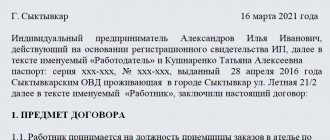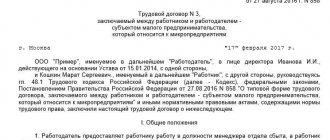When the author of this article worked in the personnel department of one of the Moscow printing houses, he often encountered the following problem.
There were a significant number of people attending job interviews who were “applying” for job positions. After talking with the deputy director of personnel and the shop manager, many of the applicants, psychologically exhausted by searching for work and refusals in other places, agreed to both low wages and rather tedious work in production. An employment contract was concluded with the future employee, and in the morning, on the day he was supposed to start work, an order was issued and his personal T-2 card was filled out. However, upon entering the workshop and hearing the foreman’s explanations about what he, a former salesman, manager, etc., should do, a person is absolutely unfamiliar with work in production and, in general, is not morally prepared for it, and even for a meager salary, in horror he rushed away from the workshop to the personnel department, begging to return his work book, to confiscate (and sometimes even tear up the employment order right in front of him (!) and never again remember his, the employee’s, existence.
Sometimes the situation was slightly modified. After the interview with the future employee, an employment contract was signed, but on the appointed day he simply did not show up for work. Attempts to find out what happened to him by calling the contact phone number specified in the contract led to only one result. "I changed my mind!" - declared the “hope” of the printing business. Or: “I found another job.”
In both cases, the deputy director for personnel gave a not entirely lawful instruction to the personnel department to seize, tear up and throw away the relevant documents about the employee, and if there were gaps in the numbering of the documentation (for example, the same employment contracts) - to state his thoughts on whether what could be used to fill them.
If you also sometimes or quite often find yourself in a similar situation, then this article is for you.
Novels of the labor code
After the introduction of amendments to the Labor Code in October last year, Part 4 of Art. 61 of the Labor Code of the Russian Federation on the annulment of an employment contract has changed almost beyond recognition. For the convenience of conducting a comparative analysis, we present the old and new editions of this article in tabular form. At the same time, words that disappeared in the old edition of the article are crossed out, while those that appeared in the new edition are highlighted in italics.
Table 1
| Old version of Part 4 of Art. 61 Labor Code of the Russian Federation | New edition of Part 4 of Art. 61 Labor Code of the Russian Federation |
| If the employee does not start work on time without good reason within a week, the employment contract is canceled. | If the employee does not start work on the start day of work established in accordance with part two or three of this article, then the employer has the right to cancel the employment contract. A canceled employment contract is considered unconcluded. Cancellation of an employment contract does not deprive the employee of the right to receive benefits for compulsory social insurance in the event of an insured event during the period from the date of conclusion of the employment contract until the day of its cancellation. |
So what has changed? One amendment is, so to speak, “cosmetic” in nature. If, according to the old version, the employee had to start work at the established
(perhaps, as it seemed to the legislator, it is not clear by whom and where)
the deadline ,
then based on the new one - on the day of start of work,
established in accordance with Parts 2, 3 of Art.
61 Labor Code of the Russian Federation .
Part 2, 3 art. 61 of the Labor Code of the Russian Federation “Entry into force of the employment contract”
The employee is obliged to begin performing his job duties on the date specified in the employment contract.
If the employment contract does not specify the start date of work, the employee must begin work on the next day after the contract enters into force.
The rest of the changes are drastic.
An entry on the cancellation of an employment contract in the work book
In accordance with the provisions of the current legislation, an entry about the employment of an employee in his work record is made within five days after the corresponding order was issued. If it is made on the very first day, then after the cancellation of the contract, the HR department employee must indicate the following: “Record No. ___ is considered invalid on the basis of order No. ___ on the cancellation of the employment contract.”
A day, not a week
Secondly, previously, in order to cancel an employment contract, the new employee had to be absent for a whole week. Now the employer can “get rid of” an “extra” employee on the staff if he did not start work on the first day. There is no need to wait another 6 days. Although, if the head of the company hopes that the employee will still make the organization happy with his work there, the employer can wait for him as long as he likes. And cancel the employment contract after, for example, a month, making sure that there is no longer any hope of a new employee.
* * *
In conclusion to the topic of annulment of an employment contract, we note once again that only a concluded employment contract can be canceled and only when the employee has not started work. We also recommend that when concluding an employment contract, do not rush to issue an order for employment immediately, you have 3 days to do this, and especially not make an entry in the work book. Then, if the newcomer fails to show up, it will be somewhat easier to cancel the employment contract.
Personnel department of a state (municipal) institution, No. 7, 2019
You have the right, but not the obligation!
Fourthly, before we are obliged
were to cancel the employment contract with such an employee.
Now the employer has the right
to do this. But he may not take advantage of this right.
Example 1
Suppose an employer calls an employee who did not show up on his first day of work and finds out that he is on sick leave. In this case, the head of the company can use his right granted to him by the Labor Code of the Russian Federation and instruct the HR department to cancel the employment contract, or maybe wait for the “newcomer” to return to work.
Example 2
The reason for a new employee’s absence from work from a legal point of view is not valid - he learned that his girlfriend from another city could come to him for just one day. In this regard, the young man called his employer and asked for leave for that day at his own expense. Of course, the head of the company has the right to refuse the employee such an impudent request and cancel the employment contract with him, or perhaps, remembering his youth and understanding the romantic feelings of the employee, and not take advantage of this right.
Should this amendment by the legislator be understood in such a way that the management of an organization can fire an employee for absenteeism (if the reason for absence from work is unjustified)? This issue is quite controversial. Indeed, before the norm of Part 4 of Art. 61 of the Labor Code of the Russian Federation gave an unequivocal negative answer to this question. If the employee did not start work within a week without good reason, the employer was obliged to
He did not have the right to automatically cancel the employment contract and, therefore, fire a new employee for absenteeism. Now the employer has the right not to cancel the employment contract, which means (we mentally complete the phrase) he can keep the employee at work... or fire him. Unfortunately, there has been no judicial practice or clarification on this matter yet. And if you decide to impose a disciplinary sanction on an employee, and he sues you for this, regardless of the latter’s decision (in your favor or not), you can be proud that you have created a legal precedent.
Cancellation procedure
The legislation does not regulate in detail the rule of what an employer should do when an employee does not come to work on his first day of work, or how to cancel an employment contract if the employee does not start work on the first day. In practice, the administration formalizes this procedure as follows.
Preparation of documents regarding the fact of the employee’s absence from the workplace
The fact that a new employee is absent from his place of work must be documented in the presence of witnesses.
The person in charge at the enterprise sends a memo to management informing them that the employee is not at work. After this, its absence is recorded.
For these purposes, an act of absence of the employee from the workplace is drawn up. However, unlike absenteeism, the employer does not have to identify the reasons why the new employee is not present.
This document should only mean that this person was not at the enterprise at the specified time.
An important point of cancellation is that the employee must not report to work on the first working day. If he does not return to work on the second or subsequent day, then it is impossible to formalize the cancellation of the employment contract.
Order to cancel the contract
This kind of order must be drawn up in free form on company letterhead, since there is no mandatory example for it.
The grounds for drawing up the order will be a memo about the employee’s failure to show up for work, an act of failure to appear, etc.
The text of the order indicates the details of the employment agreement with the employee, which was concluded and now needs to be cancelled, as well as indicate the reason for this action.
The order must be signed by the head of the organization.
Attention! The law does not prohibit the use of the method of combining this order together with an order to cancel the hiring order.
Cancellation of an employee's hiring order
It is also necessary to cancel the previously issued employment order. The law also does not define any special form for such a document.
Therefore, it can be drawn up on company letterhead in any form, or even combined with an order to cancel the employment contract.
The text of the order must indicate the full name of the employee, as well as the details of the issued employment order.
It is best to appoint the employee who was involved in the preparation of the original document as the executor for this order.
He will also have to immediately check that the newcomer is not included in the accounting sheet, and monitor the work with the work book (if an entry was made, cancel it and send a message about receipt of the document, if not, just send a message).
Invalidation of an entry in a work book
By law, a personnel employee is required to make an entry in the employee’s work book if he has worked in the company for at least 5 days, and this is his main place of work.
In this regard, if an employee did not show up for work on his first day and the contract with him was cancelled, then it would not be a mistake not to make such an entry at all. However, if the line has already been entered into the book, then it is necessary to make a note about its invalidity.
To do this, the next line writes the following sample: “The entry ... is invalid. The employment contract... was canceled in accordance with Part 4 of Art. 61 Labor Code of the Russian Federation."
Attention! The basis for this entry is the details of the order recognizing the employment contract as annulled and canceling the employment order.
Registration of notification of receipt
By the time the employment agreement is annulled, the employment record book is usually already in the hands of the personnel officer. Therefore, it must be returned to the employee. Since he is not at the enterprise on this day, a written notice must also be drawn up along with the rest of the cancellation documents.
Eligibility for benefits
Fifthly, the cancellation of an employment contract does not deprive the employee of the right to receive compulsory social insurance benefits in the event of an insured event during the period from the date of conclusion of the employment contract until the day of its cancellation.
Example 3
Let's imagine that your employee was supposed to start work on August 1, but fell ill on that day. You canceled the contract on August 2. Accordingly, the insured event occurred during the period from the day the employment contract was concluded until the day of its cancellation. Therefore, your employee will retain the right to receive benefits for the entire period of illness.
This rule of the Labor Code of the Russian Federation is consistent with the norms of the Federal Law of December 29, 2006 No. 255-FZ, which entered into force on January 1, 2007, “On the provision of benefits for temporary disability, pregnancy and childbirth of citizens subject to compulsory social insurance.” Whereas previously, according to the Regulations on the procedure for providing benefits for state social insurance, approved by a resolution of the Presidium of the All-Russian Central Council of Trade Unions on November 12, 1984 with subsequent amendments and additions, as a general rule, in case of illness before the actual start of work (even if there is a concluded employment contract), a benefit was not issued. There were only a few exceptions. Thus, for persons who graduated from a higher or secondary specialized educational institution, graduate school, clinical residency or vocational educational institution, and were assigned to work in the prescribed manner, benefits were also issued in cases where temporary disability occurred before they began work. Such benefits were paid from the day appointed for their reporting to work.
Grounds and legal consequences
There are no legal consequences for the parties. The only exception: according to Article 61, a citizen is subject to guarantees regarding compulsory social insurance if an insured event occurs. For example, an accepted person fell ill and could not leave.
According to the letter of the Federal Social Insurance Fund of the Russian Federation dated August 15, 2007 02-13/07-7585, a citizen must be compensated for temporary inability to work, starting from the date when he was supposed to begin performing his duties. Based on Part 4 of Art. 156 255-FZ, sick leave is paid if a person falls ill during the period from the moment the contract is concluded until it is declared not to have entered into force, but no more than 75 days. And in case of tuberculosis, benefits will be paid until the day of recovery or determination of disability.
Nuances of the cancellation procedure
The annulment procedure is covered very little in labor legislation, which raises a lot of questions. One of the most important is what to do with the labor code of an employee whose document has been cancelled. Upon dismissal, it must be issued on the same day or the employee must be notified.
In case of cancellation, this process is not regulated, but the company can play it safe and also send the employee a notice of receipt of the work permit.
Another point is how to prove that the employee really took his TC. This can be done in the following ways:
- Ask the employee to write a receipt stating that he received the work permit.
- Give the TC in the presence of the commission and draw up a report about it.
- If the Labor Code has already been entered into the Labor Code movement book, you can let the employee sign it, but be sure to make a note about cancellation and not dismissal (and, if possible, include a copy of the order about this). Although there is an opinion that the fact of recording the issuance of a Labor Code in this way can be regarded as the existence of an employment relationship.
Due to the above reason, under no circumstances should an order be issued to dismiss the employee upon cancellation.
At the initiative of the employee
Article 61 of the Labor Code of the Russian Federation stipulates the possibility of cancellation only for the employer. This procedure is not covered in any way by the employee, but this does not mean that he cannot do it. After all, a ban on this would be a violation of the law, since it can be regarded as forced labor, which is prohibited.
We can say that a person’s deliberate absence from work on the first day will constitute a desire to annul the contractual relationship.
At the same time, based on the same provisions of Article 61, we can conclude that the employee, like the employer, loses the right to cancel after returning to work. After this, dismissal is only possible at one’s own request or by agreement of the parties.
Labor disputes
All legal disputes with illegal cancellation are related to the fact that it is determined whether an employment relationship has actually occurred or not. This is necessary because as soon as they occur, the employer can only start the dismissal procedure. Below are a few examples where cancellation may be illegal:
Example 1
LLC "Lilac" and Karpov N.N. signed an employment contract on 03/01/2019, the start date of work was indicated as 03/05/2020. On this day Karpov N.N. went to work, received on-the-job training, and left without explanation for the rest of the day. However, the fact of attending the briefing is proof of the beginning of the employment relationship. The employer cannot cancel the contract, but he can fire N.N. Karpov. for absenteeism.
Example 2
LLC "Tulpan" and Okuneva T.T. The contract was concluded on 03/12/2019, the start date of work was not indicated. On March 13, 2019, she went to work and began performing her duties. On March 14, 2019, she did not show up for work, explaining that she was sick. After she provided sick leave, it turned out that it was opened on 03/12/2019. However, Okuneva T.T. has actually begun to perform its duties and the contract cannot be canceled.
If a cancellation occurs, it does not matter when it is made, as long as it is done before the start of the employment relationship. This is proven by the Appeal Ruling of the Kemerovo Regional Court dated November 28, 2013 N 33-11419, when the cancellation occurred 7 months after the date of return to work had passed, but, nevertheless, the employee never showed up at the employer and the court refused him in compensation for forced absenteeism and failure to issue work.










